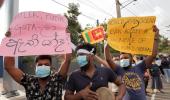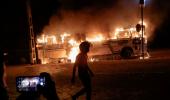The protests brought home the fact that the Sri Lankan public is in no mood for halfway measures, as voices against Rajapaksa 'family rule' and 'securitisation' of the civilian administration began sidestepping the more critical economic crisis, affecting the nation and afflicting the individual, observes Sri Lanka watcher N Sathiya Moorthy.

The fake weekend global media alert that Sri Lankan Prime Minister Mahinda Rajapaksa had quit at the end of a day-long anti-government public protests, supported though not formally sponsored by the political Opposition, should explain the state of affairs in a nation reeling under an unending economic and forex crisis, for months now.
The news video clipping of Mahinda's resignation as president after losing elections 2015 was reportedly doing the rounds internally among some Sri Lankan groups, both within the country and outside, for a couple of days before it burst out in the open -- only to be promptly denied by the prime minister's office.
That was after the Sri Lankan government had denied an earlier social media post that India had rushed troops, on request, on the eve of Sunday's protest, seeking to invest the claims with an insinuation that the loyalties of the island-nation's uniformed services might have become questionable after hardships caused by the economic crisis at the level of the individual, families and communities.
This was preceded by the Indian high commission having to promptly deny any such intent whatsoever. Though the origins of the mischievous post was yet to be tracked by Sri Lankan agencies, the fact that it spread like wildfire meant that there are sections that were overactive on an anti-India drive. But the Indian denial has put paid to such efforts as the social media 'campaign' came to as fast an end as it had begun.
Though the whole world, including all of South Asia, had suffered from the socio-economic after-effects of the global Covid lockdown, Sri Lanka is the only nation in the region and possibly outside, too, that has taken such a huge hit. The nation lost heavily on all three forex fronts: Tourism, tea and textiles exports, and inward remittances from Sri Lankan labour working overseas.
That again was not the only cause, as other nations, starting with the Maldivian neighbour, suffered even more on the tourism front. In Sri Lanka's case, the real reason was reckless profligacy dating back decades when the advent of economic reforms (1978) sounded the death knell for the agrarian economy, with imported milk powder replacing readily available fresh milk, and so on.
This was accompanied by a lack of attention to attracting overseas investments under the economic reforms, denying jobs, incomes and government revenue. Successive governments aspired to create 'global transit hubs' alongside over-crowded Singapore and Dubai on either side of the emerald isle, but in the absence of a banking hub and also attendant port facilities it did not actually take off.
When a better port was created at Hambantota in the south it went to China, which still remains a suspect in the eyes of Western traders and investors. So is the case with the Colombo Port City, a belated idea of a financial and banking hub in the capital, where the pandemic has hit progress.
Recently, in a bid to expand global acceptability, the Colombo Port City management said it needed Indian investors to make it happen. There are little chances of it happening in the foreseeable future, hence Western bankers and investors would be even more wary than otherwise, over the short and the medium-term.
The ruling Rajapaksas inherited most of the economic ills when Mahinda Rajapaksa became president in 2005. But they added their own by opting for big-ticket infra projects that were anyway not expected to bring in big moneys to repay the loans or at least the interest.
All projects were funded and executed by Chinese firms, who brought in their material and labour, with the result it was 'jobless growth' of an unprecedented kind -- which showed big GDP growth initially but hiding the rot within.
The successor government to the Mahinda presidency did nothing to upturn the events, despite being considered better money managers. Instead, President Maithripala Sirisena and Prime Minister Ranil Wickramesinghe kept fighting day in and day out, with the result no one had any time for anything administrative, starting and ending with the economy.
So, when Gotabaya Rajapaksa became president in November 2019 he had legacy issues, which was soon followed by Covid management nearer home and global lockdown. He too added to the people's woes with his quirky economic policies, starting with an import ban to promote domestic agriculture without preparing either the farmer or the end-user.
A typical case is the ban on turmeric import from Tamil Nadu, starting with denial of clearance for stocks piling up in Colombo port, when the forex crisis had not reached the nadir as yet though it was expected to do so.
This, Gotabaya did in the belief that the local farmers needed encouragement to produce more turmeric and market them locally -- but without informing them in advance, or preparing them to grow more turmeric.
Such quixotic behaviour the government leadership exhibited not soon after by ordering an overnight shift from chemical fertiliser to organic fertiliser, which had seemingly been contracted from China, without the local farmers's knowledge or that of anyone else.
When the government's agri-scientists certified the Chinese organic fertiliser unfit for local use, all hell broke loose; the tea industry that was limping thanks to the Covid lockdown, for instance, lost heavily both in terms of input costs and export-earnings.
The government also added to the people's difficulties more than was required by not approaching India early on, for procuring food and fuel aid -- focussing mostly on credit readjustments and fresh credit-lines.
For the first time in decades, Indian investments, both from the public sector and private sector (the Adani Group, among others) -- are going to create jobs, increase family incomes and government revenues, and also generate cheaper electricity from renewable sources like sun and wind.
In contrast. this time, Chinese assistance are cash and credit-based, neither in commodities as yet, and not in terms of project-investments, as used to be the case in the past. It remains to be known if it had to do with poor response, nearer home and overseas, for non-Chinese investments in the Port City, where the government has promised up to 80 per cent of the jobs for the locals -- after learning from past experience.
If the previous government, without clues about impending the Covid lockdown the world over had decided to approach the IMF, just after the tourism fall caused by the 2019 Easter serial blasts, the Gotabaya leadership allowed the storm to gather by delaying the decision, hoping to go through bilateral arrangements, both in the form of credit-line and debt-restructuring.
Barring India and China, Bangladesh was possibly the only other nation to chip in with $500 million aid, with requests since going from Colombo for a like amount.
While the government thought that it would wait out approaching the IMF and other nations, people's hunger, their frustration over continued power cuts, transport withdrawal, all building up into unprecedented anger, leading them to take to the streets, wherever they lived and however many gathered. Such decentralised protests may be easy to control, but difficult to predict.
One such protest, supposedly organised impromptu by angry citizens but led by a vocal woman MP belonging to the Opposition Samagi Jana Balawegaya, outside Gotabaya's residence in Colombo, turned violent, contributing also to the president proclaiming emergency ahead of Sunday's (April 3) nationwide protests of the kind.
The government shut down social media, the protestors, led by Opposition leaders, violated the curfew, but the protests passed off peacefully. The nation has since returned to normalcy.
However, the protests did bring home the fact that the public was in no mood for halfway measures, as slowly but surely voices against Rajapaksa 'family rule' and 'securitisation' of the civilian administration began sidestepping the more critical economic crisis, affecting the nation and afflicting the individual.
Comprehending that the dividing line between an 'Arab Spring' kind of socio-political revolution and outright anarchy was thin, Gota has since obtained the resignations of all ministers excepting Prime Minister Mahinda.
He has since recast the ministry, by replacing brother Basil as finance minister with Justice Minister Ali Sabry, Gotabaya's personal lawyer in the corruption cases against him brought up by the previous government.
As expected again, Ajith Nivard Cabral, who was named central bank governor, has quit. He occupied the same position in Mahinda's presidency and was a junior minister in Gota's team before getting back his old job.
Removing Basil was a demand of both the Opposition and also a ginger group of alliance leaders, of whom the president had sacked two ministers, Wimal Weerawansa and Udaya Gammanpilla.
Whether it is going to satisfy all ruling party MPs, who fear sure defeat whenever parliamentary elections are held (not due before August 2025) remains to be seen.
Now, after the recasting of the ministry, there seems to be some quiet in Sri Lanka. But it is too early to conclude one way or the other that the situation would remain this way, especially if there are agent provocateurs operating from behind the scenes, or if the government is unable to live up to the expectations that the ministerial reshuffle has supposedly entailed but not in real terms -- as it is old wine in an old bottle, and nothing more.
All of it has led to a situation in which what is praised as the Emerald Isle still has every chance of being referred to as a 'teardrop', which it looks like on the map. Which of it will it be in the final count is too early to predict, but it will be centred on the economy, with politics all the time seeking to overtake the same, at every turn.
N Sathiya Moorthy, veteran journalist, political analyst and author, is a policy analyst and commentator based in Chennai.










